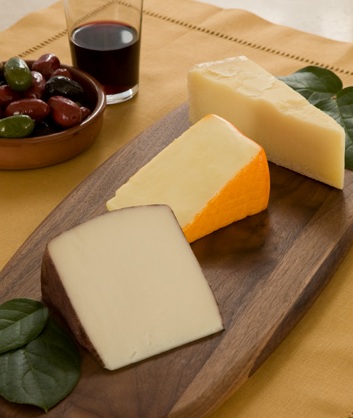
By: Â Sara Kahn, Founder of The Cheese Ambassador.
Whether you are hosting a soiree or a casual get-together this holiday, your mission is to provide your guests with warm hospitality, lively conversation and a delectable spread of food and drink. Whether the menu is complicated or simple it better be delicious. Serving a sumptuous gourmet cheese course is perfect as a starter or centerpiece of the meal. Not only is the preparation simple (no cooking!) but more importantly, your guests will enjoy discovering and savoring new favorites. As a wine lover, you want to impress with the right pairings but the overwhelming selections of wine and cheese can make your head spin. Relax. There are no hard and fast rules when it comes to choosing the right combinations of cheese and wine. Just keep in mind a few simple considerations.
A cheese course is about observing and enjoying contrasting and complementary flavors. For a foolproof gourmet cheese course, select 3 – 5 cheeses that vary in texture and flavor. Add some crusty bread, fresh or dried fruit, olives and nuts and voila!
Remember, wines are meant to cleanse the palate, wash away the tongue-coating richness of the cheese and prepare your mouth for the next delicious bite. It’s important that your selections don’t overwhelm the cheese and vice versa. Essentially, you’ll want to match wine and cheese of the same intensity level. Just remember “like for likeâ€.
Take a look at the gourmet cheese categories and wine recommendations below for guidance. You’ll see how easy it is to serve an elegant wine and cheese course. For best results, just add friends and family.
Fresh – These cheeses are not aged and usually are white and light in flavor, smooth and sometimes tangy. Try chevre (goat cheese), feta and smoked mozzarella.
Beverage Pairings – Acidic white wines stand up to the tang and milky flavors of fresh cheese. Try a Viognier or a lightly oaked Chardonnay with French goat cheese, Boutari (a white Greek wine produced on the island of Santorini) with Greek Feta and Pinot Grigio with mozzarella.
Bloomy – Encased in a whitish, edible rind, bloomy gourmet cheeses are often velvety, gooey with a mild flavor. Add Brie, Camembert or Pierre-Robert to the cheese board for a decadent treat.
Beverage Pairings – Seek out a carbonated beverage to refresh the mouth from the rich and creamy flavors. Traditionally, bloomy cheeses are served with French Champagne but also try Cava from Spain and Prosecco from Italy.
Washed Rind – During the aging process, washed-rind cheeses are usually bathed in a brine or washed with liquor such as wine, beer or a spirits. It’s this brining process that gives the cheese an aromatic quality. Almost all have orange or reddish hued rinds. Not mild and not sharp, washed rind cheeses are full-flavored. Give Taleggio, Drunken Goat, and Epoisses a taste.
Beverage Pairings – The fruity and tannic flavors of red wines work well with the stronger flavors of washed rind cheeses. Try Italian reds such as Barolo and Brunello di Montalcino with Taleggio, a Spanish Rioja with the Drunken Goat and a Cabernet Sauvignon with Epoisses.
Semisoft – These supple cheeses are rich, creamy with stronger flavors. Fontina is herbal and nutty while Morbier offers sweetness with greater pungency.
Beverage Pairings – Sample these with light and fruity reds such as a Pinot Noir or fruity whites such as Sancerre.
Firm – Typically, firm cheeses are still pliable and packed with flavor. The best are a bit crumbly and aged for robust, nutty goodness. Cheddar, Gouda and Gruyere are crowd pleasers.
Beverage Pairings – A pint of English ale is the traditional beverage of choice for Cheddar but a Sauvignon Blanc is complex enough to complement. Gouda is great with a Syrah/Shiraz and drink Beaujolais with Gruyere.
Hard – Hard cheeses are dry, crumbly and aged for intensity. Piave, Parmigiano-Reggiano and Aged Comte boast salty, caramelized, nutty flavors.
Beverage Pairings – You’ll find hearty wines can hold their own against these cheeses. Try a Barbera or Chianti with the Piave and Parmigiano and Merlot with the Comte.
Blue – The bluish-green veins give blue cheese its punch. Listed from strong to strongest in pungency are creamy Gorgonzola, nutty Stilton and salty Roquefort.
Beverage Pairings – Intense gourmet cheeses like blues can be tamed with sweet dessert wines, liqueurs and even a fruity beer. Port and sherry are traditional blue libations. For a unique treat, try a raspberry flavored beer like Belgian Lambic (look for Lindeman’s Framboise). All can be savored while lingering over dessert.
About Sara Kahn
Even though her passion for gourmet cheese was undying, Sara Kahn found shopping for it to be overwhelming, time consuming and confusing. She established The Cheese Ambassador to offer a simple way to select and serve the world’s finest cheeses. Their cheese gift baskets provide the perfect combination of exquisite cheese along with a comprehensive cheese course guide, enjoying gourmet cheese is now a deliciously enriching experience.
Do you know of any cheese that should never be paired with wine?
I’d say it sorta depends on your taste. I’m not a big fan of Guyere cheese, so I would probably not try to pair it with wine, but that’s because I wouldn’t really have it in my house. I’ve yet to find any food that can’t be paired with some kind of wine.